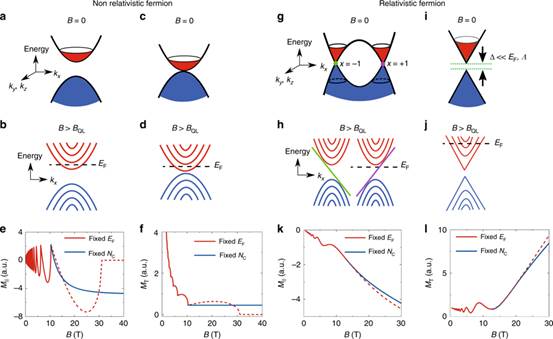Non-saturating Quantum Magnetization in Weyl semimetal TaAs
Apr 04, 2019
Peking University, April 4, 2019: The study of the Dirac and Weyl semimetal compounds has been one of the hottest topics in condensed matter physics, yet their topological band structure is highly sensitive to subtle changes of some crucial parameters such as spin-orbit coupling and chemical potentials. The energy scale can be as small as a few meV, so that an ordinary spectral technique like ARPES is unable to discern the band structure details. Their transport properties are in accordance to the Berry curvature on the Fermi surface which can also occur in a gapped semimetal with generic band structure.

Magnetic responses of the non-relativistic and relativistic fermions
a, b, c, d: The energy bands of non-relativistic (parabolic-band) fermions; g, i, h, j: The energy bands of -relativistic fermions; e, f: Calculated parallel magnetization (M||) and effective transverse magnetization (MT) of non-relativistic fermions are saturated in strong magnetic field. k, l: Non-saturated M of relativistic fermions.
This work can be found in Nature Communications 10, 1028 (2019). The first author for this work is Dr. Zhang Cheng-Long in ICQM and Assistant Professor Wang Chun Ming in in South University of Science and Technology. This work is supported by National Science Foundation of China (Grant No. U1832214, No.11774007), the National Key R&D Program of China (2018YFA0305601) and the strategic Priority Research Program of Chinese Academy of Sciences, Grant No. XDB28000000.
Edited by: Zhang Jiang
Source: International Center for Quantum Materials
